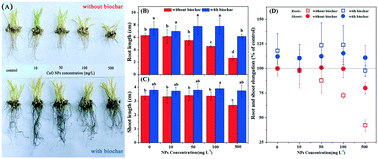当前位置:
X-MOL 学术
›
Environ. Sci.: Nano
›
论文详情
Our official English website, www.x-mol.net, welcomes your feedback! (Note: you will need to create a separate account there.)
Efficiently reducing the plant growth inhibition of CuO NPs using rice husk-derived biochar: experimental demonstration and mechanism investigation
Environmental Science: Nano ( IF 7.3 ) Pub Date : 2017-06-26 00:00:00 , DOI: 10.1039/c7en00211d Xiao-Feng Sima 1, 2, 3, 4, 5 , Xian-Cheng Shen 1, 2, 3, 4, 5 , Tao Fang 5, 6, 7, 8 , Han-Qing Yu 1, 2, 3, 4, 5 , Hong Jiang 1, 2, 3, 4, 5
Environmental Science: Nano ( IF 7.3 ) Pub Date : 2017-06-26 00:00:00 , DOI: 10.1039/c7en00211d Xiao-Feng Sima 1, 2, 3, 4, 5 , Xian-Cheng Shen 1, 2, 3, 4, 5 , Tao Fang 5, 6, 7, 8 , Han-Qing Yu 1, 2, 3, 4, 5 , Hong Jiang 1, 2, 3, 4, 5
Affiliation

|
CuO nanoparticles (NPs) have been widely used, and the inevitable release of Cu species into agricultural soil would bring potential toxicity to edible plants. Soil remediation may be the last barrier to block the entrance of Cu into the food chain of human beings. In this study, we experimentally demonstrated a new application of biochar which can significantly reduce the biotoxicity of CuO NPs on seed germination and growth of wheat (Triticum aestivum L.). The results showed that the 3% wt addition of biochar to a hydroponic culture system can completely eliminate the inhibition effect of CuO NPs on plant growth even with concentrations of CuO NPs up to 500 mg L−1, based on the comparison of germination rate, growth, and fresh and dry weight of wheat. The Cu content of shoots and roots decreased by 3.7–7.8 and 3.3–4.9 times in the presence of biochar, respectively. Further exploration indicated that both the adsorption of Cu2+ and space shield by biochar significantly suppress the entrance of Cu2+ and CuO NPs into plant cells and consequently reduce the biotoxicity of CuO NPs. These findings are of particular significance to increasing the production of crops while preventing the accumulation of metallic NPs in the food chain.
中文翻译:

稻壳生物炭有效降低CuO NPs对植物生长的抑制作用:实验论证和机理研究
CuO纳米颗粒(NPs)已被广泛使用,不可避免地将Cu物种释放到农业土壤中将对食用植物产生潜在的毒性。土壤修复可能是阻止铜进入人类食物链的最后障碍。在这项研究中,我们通过实验证明生物炭的新应用程序,可以减少显著的CuO NP的种子萌发和小麦生长的生物毒性(小麦属)。结果表明,即使在浓度高达500 mg L -1的情况下,向水培培养系统中添加3%wt的生物碳仍可以完全消除CuO NPs对植物生长的抑制作用。,基于小麦发芽率,生长以及鲜重和干重的比较。在存在生物炭的情况下,芽和根的Cu含量分别降低了3.7–7.8和3.3–4.9倍。进一步的研究表明,生物炭对Cu 2+和空间屏蔽的吸附均显着抑制了Cu 2+和CuO NPs进入植物细胞,从而降低了CuO NPs的生物毒性。这些发现对于增加作物产量同时防止食物中金属NP的积累具有特别重要的意义。
更新日期:2017-08-10
中文翻译:

稻壳生物炭有效降低CuO NPs对植物生长的抑制作用:实验论证和机理研究
CuO纳米颗粒(NPs)已被广泛使用,不可避免地将Cu物种释放到农业土壤中将对食用植物产生潜在的毒性。土壤修复可能是阻止铜进入人类食物链的最后障碍。在这项研究中,我们通过实验证明生物炭的新应用程序,可以减少显著的CuO NP的种子萌发和小麦生长的生物毒性(小麦属)。结果表明,即使在浓度高达500 mg L -1的情况下,向水培培养系统中添加3%wt的生物碳仍可以完全消除CuO NPs对植物生长的抑制作用。,基于小麦发芽率,生长以及鲜重和干重的比较。在存在生物炭的情况下,芽和根的Cu含量分别降低了3.7–7.8和3.3–4.9倍。进一步的研究表明,生物炭对Cu 2+和空间屏蔽的吸附均显着抑制了Cu 2+和CuO NPs进入植物细胞,从而降低了CuO NPs的生物毒性。这些发现对于增加作物产量同时防止食物中金属NP的积累具有特别重要的意义。



























 京公网安备 11010802027423号
京公网安备 11010802027423号